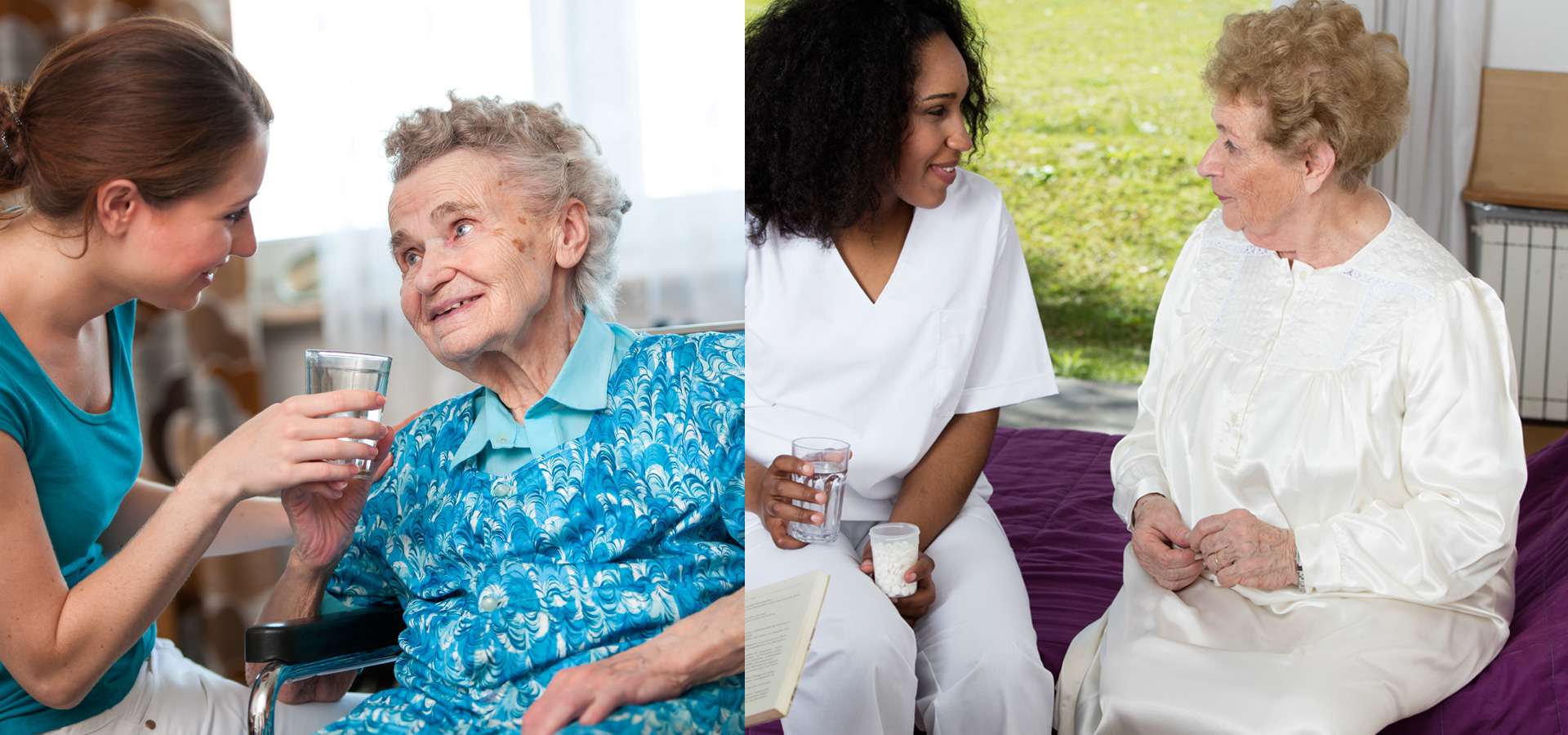Despite the rising popularity of in-home care for seniors, people still have reservations about bringing a caregiver into the home to care for their aging loved one. Inviting a stranger into your loved one’s home is an area of concern, however, it’s important to understand the misconceptions and truths when it comes to the home care industry. Here’s a closer look at 5 myths and facts to help you separate fact from fiction. Myths and Facts: MYTH # 1: I have no idea who will be coming into my home. FACT: The state of Colorado requires any caregiver working with senior submit to a background check. In addition, ask the agency what their selection process for caregivers is like. Many agencies do extensive screening and interviewing before bringing a caregiver on board and will be able to tell you a lot about the caregiver who will be coming into your home. Elderlink Home Care, Inc. is regulated and monitored by the Colorado Department of Public Health and Environment. This is typical of all home care agencies. All caregivers working with Elderlink Home Care, Inc. are thoroughly screened with an extensive 4-part background check and orientation. Elderlink Home Care Inc. is a highly reputable business; serving metro-Denver for 30-years. MYTH # 2: I have children that will assist me when I need it. FACT: Often times, the adult children of aging loved ones are very involved in their parents care. However, they may have their own busy lives to manage as well. There may come a time when the aging parent needs assistance that the adult child is unable to provide. In addition, having outside help will enable the adult children to focus on the relationship with their parents as opposed to getting overwhelmed with being the primary caretaker. It also offers them tremendous peace of mind, which is priceless. When family members are the primary caregivers, burnout becomes a very real thing. Work and family demands are stressful enough. While many families hesitate to reach out for outside help due to feelings of guilt, often times it is the healthy thing to do. Having outside help allows the family to breathe easier and it reduces stress. It allows for your loved one to have focused care and for the family to manage their lives and preserve their precious and important relationship with their aging parent(s). MYTH # 3: If I need home care, my insurance will take care of it. FACT: Traditional health insurance and Medicare do not cover the costs of non-medical in-home care. Long-term care insurance will usually reimburse for this type of care if you have a policy. It is a common myth that the government will provide and pay for non-medical in-home care if a senior is no longer able to live independently in their own home. However, this is typically not the case. Health insurance or Medicare will typically cover the costs of in-home medical care after a hospitalization or surgery, however, no assistance with the activities of daily living. It is better to plan ahead and do your research in the event you may require some assistance and it is your wish to remain in the comfort of your own home. Seniors who purchased a long-term care insurance policy earlier in life can usually get reimbursed for some or all costs of non-medical home care when they determine it is needed. Typically, if a senior does not have long-term care insurance, non-medical home care is private/self-pay. MYTH # 4: Home care is too expensive, I can’t afford it. FACT: Home care is more affordable than you might think! When compared to the cost of an assisted living facility or nursing home, home care can be a more affordable option for many seniors. The average annual cost of one nursing home resident is $102,565.00. The average annual cost of one assisted living facility resident is $46,200.00 (Genworth Financial). MYTH # 5: Home care is for people who are totally dependent… I don’t need home care, I can do most things on my own! FACT: Caregivers help with a variety of different daily living activities. Some clients may need more help than others, however, the majority of home care recipients are still able to do a lot of things on their own. They have the home care to assist with things that are possibly becoming a little more difficult for them. This helps the client keep their routine and independence. Non-medical, in-home care includes a variety of services. Caregivers are able to assist with basic, more supportive tasks such as light housekeeping, grocery shopping, and transportation. They are also able to care for clients needing more intensive, hands-on care, such as bathing, dressing, and toileting. The type of care and level of care can be customized to meet the needs of the client. ELDERLINK HOME CARE, INC. – Specializing in In-Home Care & Serving the Denver Area In today’s world of “fake news,” it’s important to have a clear understanding of in-home care, the services, and the benefits. Elderlink Home Care, Inc. has served the Denver area for 30 years with a stellar reputation and thousands of satisfied clients. They take great pride in their knowledgeable, compassionate staff and their commitment to quality care. Don’t just take our word for it: check out the testimonials from past and present clients. The pairing process is well-planned by assessing your loved one’s needs and hand selecting a caregiver with the knowledge and skills to meet those needs. Whether it’s a basic task of laundry or a more involved task of bathing, your loved one will feel more at ease in their own home and you’ll feel less stressed knowing they are receiving great care. For more information about Elderlink Home Care, Inc’s services, contact us today. We’ll start working with you to identify the best strategy to get your loved one the care they need.
Make an Appoinment
April, 2018 | Elderlink Home Care
Elderlink Home Care, Inc. is pleased to announce the winner of our ‘Celebrating 30 Years’ grant; Mrs. Ethel Steward, 90 years young! Mrs. Steward was nominated by her daughter, Deb Lockwood. She was born in Missouri and grew up in Kansas. Her husband, William, was in the Army for over 20 years. This caused Mr. & Mrs. Steward to move around a lot. They have lived in many places all over the world. While living in Tokyo, they welcomed a daughter, Deb, into their lives. Sadly, Mr. Steward passed away in 1978. Their daughter, Deb, was living in Colorado and Mrs. Steward decided to move to Colorado as well. She moved here in 1979 and has been here ever since! She has 3 grandchildren and 3 great-grandchildren. She had a career in banking during her adult life. When she retired from banking, she began working as a child care provider. She definitely kept busy! Ethel isn’t sure what she is going to do with the grant money quite yet, however, she knew she had immediate plans to go to lunch with her daughter, Deb. Congratulations Ms. Steward! If you would like to nominate a senior for our monthly grant, please click here!
Dining out is fun no matter your age. For seniors, it’s a special treat to get out of the house and to enjoy a meal in public where they may see people they know. If you are planning to take your senior parents to dinner, or you are an in-home caregiver taking a patient to dinner, then selecting the right restaurant is important. There are senior-friendly restaurants in the Denver area that offer discounts and deals. Here’s a list of the top 3. The Best Senior-Friendly Restaurants Around Denver 1. Applebee’s Applebee’s offers a senior discount of 15% off total bill for those age 60 and older. Menu items range from delicious steaks to chicken and seafood. Start by sharing an appetizer and if visiting at lunchtime, try one of their lunch combos. Other menu options include pasta and salads. Save room for dessert because it’s hard to say no to Applebee’s butter pecan blondie! 2. Denny’s AARP members are eligible to receive a 15% discount off their total bill every day. A special menu is available for those aged 55 and older. Traditional meals such as country-fried steak and grilled chicken are on the menu. Breakfast items include French toast and omelets. For lunch, seniors can try a grilled cheese and soup. There are several Denny’s locations throughout the Denver area. Thanks to their partnership with AARP, Denny’s remains a popular restaurant for seniors. 3. IHOP IHOP offers an exclusive menu for guests age 55 and older. The menu offers smaller portions of classic dishes including create-your-own omelets and a roasted turkey dinner, all at a lower price. For a healthier option, seniors may enjoy the grilled tilapia. Side dish options range from mashed potatoes and gravy to steamed broccoli. Don’t forget about their selection of pancakes! After all, it is the International House of Pancakes! The Importance of Seniors Dining Out The social interaction of dining out is important in a senior’s life. As many seniors no longer drive, having someone take them out is crucial to limiting senior isolation. Many seniors also live alone and have to cook for themselves, resulting in poor nutrition. Dining out is one way to ensure they are getting a hot and nutritious meal. Finding Time Major holidays are often times of family gatherings at restaurants. Seniors, however, need to get out more than the occasional Mother’s Day or Easter brunch. For their busy adult children, finding the time to take their loved one out to eat is difficult. Work and family commitments are overwhelming yet it is easy to develop guilty feelings about caring for their parents. It is better to ask for help than to try to balance everything yourself. There will be less stress and times together will be more enjoyable if you have help in caring for your senior parents. Elderlink Home Care Elderlink Home Care, Inc. has a professional, caring staff dedicated to providing you with a positive home care experience. Taking their clients out for an enjoyable meal is something our caregivers can assist with. Not only can they take their clients out for a meal if they desire, but they can also help with menu planning and preparation at home. Home care can help prevent your loved one from feeling lonely and isolated. From going to the movies and other recreational activities, you can rest easy knowing your loved one is being properly cared for so you can concentrate on other responsibilities. For more information about in-home care by Elderlink and for a full list of services, contact us today. Elderlink has proudly served the Denver area since 1988. For 30 years, they have provided in-home care for Denver area residents and have received many positive testimonials from current and past clients. Let us help you in ensuring your loved one is properly cared for and getting all of their needs met.
Older adults can experience pain related to many different conditions. Back pain, in particular, has a variety of possible causes, though the most common causes of chronic back pain in seniors are osteoarthritis and spinal stenosis. People over the age of 60 are more likely to experience back pain related to the degeneration of the joints in the spine. The good news is that there are also a variety of simple solutions that may help ease this pain. Sometimes the simplest answer is the best, and in some cases, one little change can make all the difference. For others, a few adjustments to their habits or lifestyle can ease the discomfort. There are other options besides surgery and prescription drugs. Causes of Osteoarthritis Arthritis is a general term that means the swelling of a joint. Osteoarthritis occurs when the cartilage at the joint wears down, leaving the bones without any protection against each other; it is the most common type of arthritis. It can occur at any joint in the body, though it is common in the spine. When this happens, or if the cartilage is chipped or damaged on one side, the injured cartilage or the neighboring bone rub against the bone, causing further injury. This, along with the accompanying joint inflammation and muscle spasm, cause back pain. Causes of Spinal Stenosis This is a narrowing of the bone channel occupied by the spinal cord and nerves, which puts pressure on the nerves and can result in tingling, numbness, or pain. Spinal stenosis is related to osteoarthritis and degeneration of the spine and could show up in the fifth decade of life and continue through the years. When the lower back develops lumbar stenosis, the spinal nerve roots in the low back become compressed and produce symptoms of sciatica—tingling, weakness, or numbness that radiates from the low back and into the buttocks and legs. This often gets worse with activity, which leads people to avoid movement and exercise. Unfortunately, a sedentary lifestyle leads to additional health issues. Symptoms of Chronic Back Pain in Seniors Symptoms of osteoarthritis may include: • Pain that is most pronounced in the mornings and evenings. • Pain that interrupts sleep. • Pain after activity. • Tender when pressed against. • Stiffness and loss of flexibility in the back (being unable to twist or bend comfortably at the waist). Spinal stenosis often features slightly different symptoms: • Leg and lower back pain after even a short walk. • Lower back pain that is quickly relieved by sitting down. • Weakness, numbness, and tingling that moves from the low back into the buttocks and legs (sciatica). In both cases, symptoms ranging from mild to severe may start slowly and increase over time. Simple, Natural Treatments for Chronic Back Pain in Seniors 1. New, High-Quality Mattresses: All mattresses are not created equal! A high-quality mattress can offer huge relief for those experiencing back pain since old, worn-out mattresses do little to support the back or neck. 2. Better Diet: Healthy fats (flaxseed oil, avocado oil, olive oil, etc), fruits, vegetables, nuts, ginger, garlic, oatmeal, and lean protein sources all help reduce inflammation. Meanwhile, dairy, pastries, red meat, alcohol, caffeine, sugar, refined grains, and any heavily processed foods are best to avoid because they increase inflammation in muscles and joints. 3. Yoga: Many older adults have found the practice of yoga to work in their favor, particularly by practicing restorative yoga, a deeply relaxing approach to the traditional practice. Depending upon your range of motion and fitness level, you might also choose a gentle hatha yoga or chair yoga class. Studies have shown positive outcomes like decreased pain, increased the range of motion and a greater sense of well-being for people with back pain. John Hopkins offers more tips for doing yoga with arthritis. 4. Acupuncture: This is a gentle, alternative medicine approach to help ease and treat the aches and pains in aging bodies. Instead of treating symptoms, acupuncture helps treat the pain source naturally, without the use of drugs. 5. Massage Therapy: Pills can cause many side effects and long-term health problems when taken too frequently. Massage therapy improves circulation and reduces inflammation and swelling; studies have shown it to be effective in reducing chronic back pain, which may reduce a patient’s need for pain pills. Treating chronic back pain in the elderly doesn’t always mean resorting to prescribed anti-inflammatory drugs. There are all-natural alternatives that your caregiver may be able to help you try. Contact us today to learn more about in-home senior care.




